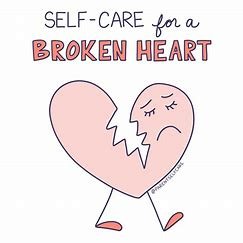Going through a breakup is never easy, but handling it with grace and prioritizing self-care can make the process more manageable and help you heal in a healthy way.

1. Allow Yourself to Feel
- Acknowledge Your Emotions: It’s normal to experience a wide range of emotions after a breakup, from sadness to relief, anger, or confusion. Allow yourself to feel these emotions without judgment. Don’t rush yourself to “move on” quickly.
- Give Yourself Permission to Grieve: Even if the breakup was your decision, it’s still a form of loss. Allow yourself the time to grieve, just like you would for any significant change in your life.
2. Give Yourself Time and Space
- Avoid Rushing into Another Relationship: After a breakup, it’s tempting to quickly jump into a new relationship, but this can prevent you from fully healing. Take time to rediscover yourself and focus on your own needs.
- Create Distance from Your Ex: If possible, limit contact with your ex, at least for a little while. Constantly checking in or staying in touch can delay healing. Use the space to reflect on the relationship and gain clarity.
3. Engage in Self-Care
- Focus on Your Physical Health: Exercise, eat nourishing food, and get plenty of rest. Taking care of your body can help you feel better physically and emotionally during tough times.
- Do Things That Bring You Joy: Engage in activities that make you feel good—whether it’s a hobby you’ve always loved, spending time with supportive friends, or taking up something new and exciting. This can help redirect your energy and attention.
- Practice Relaxation: Stress-reducing practices like meditation, yoga, or journaling can help you process your emotions and calm your mind during a time of emotional turbulence.
4. Seek Support
- Talk to Trusted Friends and Family: Share your feelings with loved ones who can offer you comfort, perspective, and understanding. Sometimes, just talking things through with someone who listens can lighten the emotional load.
- Consider Professional Help: If you’re struggling to cope, a therapist or counselor can help you work through your emotions and gain insight into the breakup, ultimately guiding you toward healing and self-discovery.
5. Avoid Blaming Yourself or Your Ex
- Let Go of Guilt: Even if you were the one who ended the relationship, it’s common to feel guilty. Remember that relationships are complex, and it’s okay to prioritize your own well-being and happiness.
- Release Resentment: Holding onto anger or resentment can prolong the pain. Try to forgive both yourself and your ex, even if it’s just for your own peace of mind. This doesn’t mean condoning any hurtful behavior but freeing yourself from carrying the weight of negative emotions.
6. Reflect and Learn from the Experience
- Identify the Lessons: Take some time to reflect on the relationship, what worked, what didn’t, and what you’ve learned about yourself. This can help you grow emotionally and set healthier patterns for future relationships.
- Set New Goals: Use this time to focus on your personal growth and future aspirations. Setting new goals, whether they’re personal, career-related, or social, can give you something to look forward to and help you shift your energy toward positive changes.
7. Limit Social Media Exposure
- Unfollow or Mute Your Ex: It’s tempting to check up on your ex’s social media, but it can hinder your healing process. Consider unfollowing or muting them temporarily to avoid unnecessary reminders of the breakup.
- Avoid Comparing Yourself to Others: Social media often shows a curated version of people’s lives, and comparing your healing journey to someone else’s can make you feel worse. Focus on your own path and recovery, and try to disconnect from the online noise.
8. Stay Positive About the Future
- Believe in New Beginnings: Even though it may feel like the end of something important, remember that breakups are also opportunities for growth and new experiences. Trust that better things are ahead, even if it takes time to see them.
- Don’t Rush the Process: Healing takes time. Be patient with yourself and trust that, eventually, you’ll feel more whole again. It’s okay to take small steps forward.
9. Set Boundaries Moving Forward
- Set New Relationship Standards: Once the dust settles, think about what you want in future relationships. What were the positive and negative aspects of your past relationship? Setting boundaries for yourself and future partners can help you avoid repeating patterns that weren’t serving you.
- Respect Your Own Needs: As you move on, it’s important to honor your personal space, emotional needs, and boundaries in all future relationships.
Things You Can Do to Cultivate Grace During a Breakup:
- Be Respectful and Civil: If you need to interact with your ex (especially if you share mutual friends or responsibilities), try to remain respectful and civil. Avoid engaging in drama, insults, or behaviors that could complicate things further.
- End Things with Kindness: If you’re the one ending the relationship, be clear but kind. It’s better to give closure with respect, acknowledging what the relationship meant, and expressing gratitude for the good times you shared.
Why Grace and Self-Care Are So Important:
- Protecting Your Mental Health: Breakups can trigger anxiety, depression, and stress. Prioritizing self-care and allowing yourself the grace to feel and heal will protect your emotional well-being.
- Building Resilience: Navigating a breakup with grace teaches you resilience. It shows you that, even in difficult times, you can find strength within yourself to heal, learn, and grow.
- Starting Fresh: Taking care of yourself after a breakup sets the foundation for a healthy and positive future, both for your own well-being and for any future relationships you may have.
